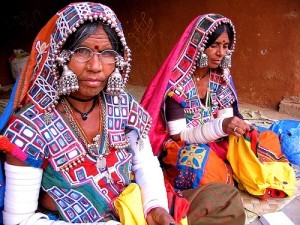
Our Community
 We talk a lot about how impact investments help people move out of poverty. But impact investments are not just about providing a job and an income; impact investments provide dignity, self confidence, and the ability to stand on your own feet. When that investment is in women, the impact is even more profound.
We talk a lot about how impact investments help people move out of poverty. But impact investments are not just about providing a job and an income; impact investments provide dignity, self confidence, and the ability to stand on your own feet. When that investment is in women, the impact is even more profound.
Over the past decade of working in India, I have seen some incredible businesses, social entrepreneurs and hybrid organizations emerge. The success of these organizations has largely been based on their ability to shift with the needs of the community, invest in leadership, and teach financial literacy for long-term success. I want to highlight one particular hybrid investment, Gramshree, an organization that I have known and worked with for over nine years.
As the co-founder of Indicorps, I had the privilege to work with Gramshree from its early days. Gramshree was started as a way to help the women in Kachchh get back on their feet after the 2001 earthquake. Today Gramshree has expanded from its grassroots initiative to a successful store based in Ahmedabad, Gujarat that sells high-end apparel, home furnishings, accessories, corporate gifts, and kachchhi crafts and products. The organization originally started the mission to help marginalized rural and slum women, providing them jobs and an income making apparel and accessories. However, they quickly realized that offering only job training for the women was not enough. In fact, for their long-term success women needed leadership training, and more attention to help them deal with their personal and financial information. Most of these women did not have much of an education, and they did not know how to be independent, but they wanted to learn. That required a longer-term investment.
Hence, Gramshree became a hybrid organization. The key women behind Gramshree – Anar Patel and Vandana Agarwal – set out to create a whole new organization (and eventually a company) and a craft cooperative to help develop and maintain the skills of authentic stitching, design and craftwork unique to the region. The business can now cover its costs, and in fact does well. However, they still use grants for providing the women leadership training -which includes how to run a household, how to manage money, and how to eat healthy and live within their means- basic healthcare, and financial training, which teaches the women about savings and helps them get bank accounts.
After nine years, Gramshree is beginning to see results. They are one of the best stores in Ahmedabad, India that sells clothing, purses and household items made by women from low-income and marginalized communities. They have learned how to stich, design and produce incredibly good products. All of the women working there have bank accounts, with ATM cards, sothey can control their finances. Life is changing for these women. You can tell when you go the slums or the villages who works for Gramshree because the houses are cleaner, the children are in school, and there is more self confidence. Gramshee has successfully taught women how to become entrepreneurs! Building upon their success, they are now working with women in more rural areas, so these women are able to earn an income and live in their homes instead of moving to the cities, where they would need to live in slums.
Investments in organizations like Gramshree and many others are critical. These organizations are helping women find a voice, teaching them how to save, giving otherwise marginalized women an opportunity, and creating jobs. Each of these components is critical if we want to make a dent in affecting poverty. But for these organizations to grow, it requires investors who are not just willing to expand the business, but also provide the soft skills, management training, marketing and sales skills and a growth strategy to match their ambitions.
Investing in entrepreneurial women has a tremendous potential to affect not only women, but improve the lives of families.
Sonal Shah, Tides Fellow
Sonal Shah has spent her career as an entrepreneur and innovator in government, business and the non-profit sectors. She is the former Deputy Assistant to the President and Director of the first White House Office of Social Innovation and Civic Participation focused on investing in and scaling innovative models in the social sector to solve some of the nation’s toughest challenges. She also served on President Obama’s Transition Board overseeing the Technology, Innovation, Government Reform working group. Before joining the White House, Sonal led Google’s global development initiatives for its philanthropy, Google.org. Prior to Google, Sonal was a Vice President at Goldman Sachs, Inc. where she developed and managed the firm’s environmental strategy.
Sonal also has significant non-profit experience. She co-founded a non-profit, Indicorps, which offers fellowships for Indian-Americans to work on development projects in India. She helped set up the Center for Global Development where she managed the daily operations and developed the policy and advocacy programs for the Center. She also worked at the Center for American Progress focusing on trade, outsourcing and post conflict issues. From 1995-2002, Sonal was an economist at the Department of Treasury, where she directed the office for African Nations, worked on the Asian Financial Crisis and post conflict development in Bosnia and Kosovo. Sonal received her MA in Economics from Duke University and BA in Economics from the University of Chicago. She is an Aspen Crown Fellow and a Next Generation Fellow.
Photo via Flickr user sriharsha, used under Creative Commons license

Read the stories and hear the voices of social change leaders fighting for justice.